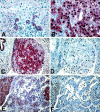Nuclear accumulation of mutated beta-catenin in hepatocellular carcinoma is associated with increased cell proliferation
- PMID: 10487827
- PMCID: PMC1866892
- DOI: 10.1016/s0002-9440(10)65168-1
Nuclear accumulation of mutated beta-catenin in hepatocellular carcinoma is associated with increased cell proliferation
Abstract
Inappropriate activation of the Wnt pathway resulting from beta-catenin gene alterations has recently been implicated in the development of hepatocellular carcinoma (HCC). To explore the in vivo effects of mutated beta-catenin, HCC specimens from 32 patients carrying one or several tumors were screened for somatic mutations in exon 3 of the beta-catenin gene, and the expression and subcellular localization of beta-catenin was studied by immunohistochemistry. Missense mutations or interstitial deletions in beta-catenin exon 3 were detected in 12 of 35 (34%) HCC samples. After immunostaining, most tumors exhibited increased membranous and/or cytoplasmic expression of beta-catenin compared with adjacent nontumoral liver. Strong nuclear accumulation of beta-catenin was observed either focally or uniformly in 15 of 35 (43%) tumor specimens, but not in cirrhotic nodules or dysplastic liver cells in adjacent liver. Aberrant nuclear expression of beta-catenin was significantly associated with the presence of mutations in the beta-catenin gene (P < 0.005). Moreover, nuclear beta-catenin staining correlated significantly with increased Ki-67 proliferative index in tumor (P < 0.001) and seemed to be associated with poor outcome in patients with HCC. In conclusion, our data indicate that activation of the Wnt/beta-catenin pathway in HCC results mainly from somatic mutations in the beta-catenin gene and may promote tumor progression by stimulating tumor cell proliferation.
Figures


References
-
- Murray CJL, Lopez AD: Mortality by cause for eight regions of the world: global burden of disease study. Lancet 1997, 349:1269-1276 - PubMed
-
- Nagai H, Buendia MA: Oncogenes, tumor suppressors, and co-factors in hepatocellular carcinoma. Koshy R Caselman W eds. Hepatitis B Virus. 1998, :pp 182-218 Imperial College Press, London
-
- Nagai H, Pineau P, Tiollais P, Buendia MA, Dejean A: Comprehensive allelotyping of human hepatocellular carcinoma. Oncogene 1997, 14:2927-2933 - PubMed
-
- Murakami Y, Hayashi K, Hirohashi S, Sekiya T: Aberrations of the tumor suppressor p53 and retinoblastoma genes in human hepatocellular carcinomas. Cancer Res 1991, 51:5520-5525 - PubMed
-
- Hsu HC, Peng SY, Lai PL, Sheu JC, Chen DS, Lin LI, Slagle BL, Butel JS: Allelotype and loss of heterozygosity of p53 in primary and recurrent hepatocellular carcinomas. Cancer 1994, 73:42-47 - PubMed
MeSH terms
Substances
LinkOut - more resources
Full Text Sources
Other Literature Sources
Medical
Molecular Biology Databases
Miscellaneous

